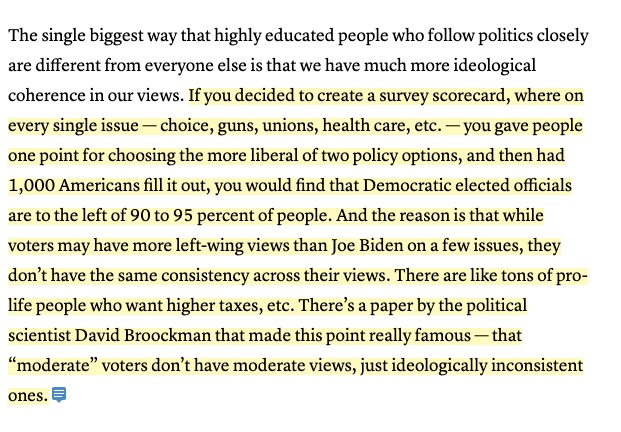
Thought-provoking interview on how American politics really works and how elections are really won.
nymag.com/intelligencer/…
Some of my favorite bits 👇
nymag.com/intelligencer/…
Some of my favorite bits 👇
Voters have a few radical views that they are the most passionate about so candidates tend to be more radical than people that vote for them 

Whatever issues are getting most talked about is what people end up voting on.
"In 2012, both sides talked about health care. In 2016, they didn’t. And so the correlation between views on health care and which candidate people voted for went down."
"In 2012, both sides talked about health care. In 2016, they didn’t. And so the correlation between views on health care and which candidate people voted for went down."

People may feel one way about an issue in a vacuum but there is a strong identity layer where they agree with their party once they know the party's view. 

Voters trust the parties on different issues.
If the main issue is the environment, poverty, or race relations then leftist parties tend to win.
If the main issue is the economy, unemployment or crime, further right parties tend to win.
If the main issue is the environment, poverty, or race relations then leftist parties tend to win.
If the main issue is the economy, unemployment or crime, further right parties tend to win.

@Scholars_Stage did a nice write up as well ith the TL;DR:
"the reality is that voters do not make their votes on the basis of individual policies, but a general idea of whether the candidate can be trusted to handle the issue before him."
scholars-stage.blogspot.com/2020/08/how-to…
"the reality is that voters do not make their votes on the basis of individual policies, but a general idea of whether the candidate can be trusted to handle the issue before him."
scholars-stage.blogspot.com/2020/08/how-to…

• • •
Missing some Tweet in this thread? You can try to
force a refresh





